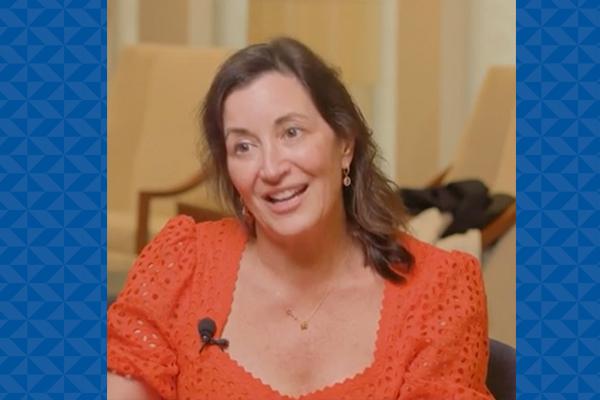
Uterine cancer cases have been increasing about 1% each year, and they are the fifth leading cause of cancer deaths in women. Gynecologic Oncologist Angeles Alvarez Secord, MD, MHSc, has dedicated her career to the study of abnormal tumor cells, the proteins on cancerous cells and the genes that make up these cells that cause uterine cancer. She has been instrumental in developing innovative treatment options through clinical trials.
In June (Uterine Cancer Awareness Month), Dr. Secord was featured in a video to educate women about endometrial cancers that arise from the lining of the uterus — the most common type of uterine cancer. She emphasizes the importance of knowing the signs and symptoms, discusses and her work to determine why women are developing these cancers and describes efforts to develop new treatment options.
To achieve this, she and Duke colleagues established the Endometrial Cancer Molecularly Targeted Cancer Consortium in 2019 after being awarded a $1 million grant from the Kay Yow Cancer Fund/V Foundation for Cancer Research. The Duke Department of Obstetrics and Gynecology was the founding site for the consortium.
Through her continued efforts to amplify the importance of cancer research, and to address trends in the occurrence of uterine cancer, Dr. Secord will be featured in an upcoming television news feature/special report on the rising rates of uterine cancer in younger women (set to air in September on Gray InvestigateTV).
Additionally, Dr. Secord recently was featured as follows:
- WRAL documentary titled “Diagnosis: Young, The New Face of Cancer in NC," which explores why physicians and researchers at Duke Cancer Institute are seeing cancers that are not only appearing earlier, but also acting more aggressively.
- WRAL article "'I Felt So Weak': NC Woman Urges Awareness After Endometrial Cancer Diagnosis at 32," which includes Dr. Secord emphasizing the importance of patients and providers recognizing warning signs, the need for continued research as federal funding cuts are impacting medical studies nationwide and evaluation of linkages between foods that comprise the typical diet today and the onset of disease.
- WNCN-TV feature "Raising awareness of the subtle signs of ovarian cancer"